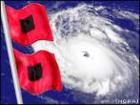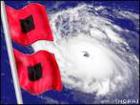
NOAA National Hurricane Center
Storm Tracker
Hurricane Tips
Hurricane Checklist
Know where you will go if you have to evacuate.
Plan your evacuation route.
Contact the local emergency management office or other disaster preparedness organization, and ask for the community hurricane preparedness plan. This plan should include information on the safest evacuation route and nearby shelters.
Have disaster supplies on hand in the event of a storm, or if you have to evacuate:
Flashlight and extra batteries
Portable, battery-operated radio and extra batteries
First aid kit and first aid manual
Food (non-perishable)
Water (one gallon of water per person per day)
Non-electric can opener
Essential medicines
Baby supplies (diapers, non-perishable milk, baby food)
Portable, battery-operated radio and extra batteries
First aid kit and first aid manual
Food (non-perishable)
Water (one gallon of water per person per day)
Non-electric can opener
Essential medicines
Baby supplies (diapers, non-perishable milk, baby food)
If you are ordered to evacuate, you should also take:
Personal items, such as toilet paper, toothbrush, towel, tampons, soap
Books, small games and other small entertainment items
Important papers and valuables in a waterproof container
Names and addresses of relatives, friends and other important contacts
Clothing and bedding
Cash and credit cards
Sturdy shoes
Books, small games and other small entertainment items
Important papers and valuables in a waterproof container
Names and addresses of relatives, friends and other important contacts
Clothing and bedding
Cash and credit cards
Sturdy shoes
Make arrangements for pets.
Pets may not be allowed into emergency shelters for health and space reasons. Contact your local humane society for information on local animal shelters.
Make plans for your boat.
Decide what to do with your boat if a storm hits. Choices include taking it out of the path of danger, securing it on a trailer and leaving it parked in a safe area, securing it in a marina or mooring it in a "safe" harbor. If you decide to leave the Keys with your boat, make sure to leave early because after the advent of storm force winds, trailers will no longer be allowed on the highway.
Protect valuable documents and property, including:
Birth certificates
Marriage certificates
Social security cards
Passports
Immunization records
Bank account and credit card numbers
Photos/video of your home and valuable property
Vehicle titles
Military service papers
Wills
Insurance policies, including personal, homeowners and disaster insurance
Deeds
Stocks
Bonds
Irreplaceable photos
Computer back up of important electronic data
Jewelry
Marriage certificates
Social security cards
Passports
Immunization records
Bank account and credit card numbers
Photos/video of your home and valuable property
Vehicle titles
Military service papers
Wills
Insurance policies, including personal, homeowners and disaster insurance
Deeds
Stocks
Bonds
Irreplaceable photos
Computer back up of important electronic data
Jewelry
Make sure that all family members know how to respond after a hurricane. Teach family members how and when to turn off gas, electricity, and water.
Teach children how and when to call 911, police, or fire department and which radio station to tune to for emergency information.
Protect your windows.
Permanent shutters are the best protection. A lower-cost approach is to put up plywood panels. Use 1/2 inch plywood--marine plywood is best--cut to fit each window. Remember to mark which board fits which window. Pre-drill holes every 18 inches for screws. Do this long before the storm.
Trim back dead or weak branches from trees.
- Develop an emergency communication plan.
In case family members are separated from one another during a disaster (a real possibility during the day when adults are at work and children are at school), have a plan for getting back together. Ask an out-of-state relative or friend to serve as the "family contact." After a disaster, it's often easier to call long distance. Make sure everyone in the family knows the name, address, and phone number of the contact person.
- Take pictures of your house and property.
Take photos and/or video of your house, it's contents and the surrounding property. This will make it easier to prove loss to your insurance company following landfall.
Hurricane Watches and Warnings
A hurricane watch is issued when there is a threat of hurricane conditions within 36 hours. A hurricane warning is issued when hurricane conditions (winds of 74 miles per hour or greater, or dangerously high water and rough seas) are expected in 24 hours or less.
During a Hurricane Watch
- Listen to local radio or television stations for hurricane progress reports and emergency orders.
- Check emergency supplies.
- If you have not already done so, fuel your car.
- If you have not already done so, stock up on water, non-perishable food, water and ice.
- Bring in outdoor objects such as lawn furniture, toys, and garden tools and anchor objects that cannot be brought inside.
- Secure buildings by closing shutters and/or boarding up windows.
- Turn refrigerator and freezer to coldest settings. Open only when absolutely necessary and close quickly.
- Fill bathtubs, washing machines, sinks and other containers with clean water.
- Review evacuation plan.
During a Hurricane Warning
- Listen to local radio and television stations constantly for official instructions.
- Store valuables and personal papers in a waterproof container on the highest level of your home, or take them with you if you evacuate.
If you are at home:
- Stay inside, away from windows, skylights, and glass doors.
- Keep your emergency supply of flashlights and extra batteries handy. Avoid using open flames, such as candles and kerosene lamps, as a source of light.
- If power is lost, turn off major appliances to reduce power "surge" when electricity is restored.
If officials indicate evacuation is necessary:
- Secure your home by unplugging appliances and turning off electricity and the main water valve.
- Tell someone outside of the storm area where you are going.
- If time permits, and you live in an identified surge zone, elevate furniture to protect it from flooding or better yet, move it to a higher floor.
- Gather pre-assembled emergency supplies, warm protective clothing, blankets and sleeping bags. Review directions to the nearest shelter.
- Leave as soon as possible. Avoid flooded roads and watch for washed-out bridges.
- If you evacuated, return home only after authorities advise that it is safe to do so.
- If you evacuated, and your house has been vacant for a period of time, enter with caution.
- Stay tuned to local radio and/or television for information. Emergency officials will announce when you may return to your home, or when it is safe to venture outside
- Help injured or trapped persons if you can do so without injury to yourself. Give first aid where appropriate.
- Do not move seriously injured persons unless they are in immediate danger of further injury. Call for help if possible, otherwise wait and help will come to you.
- Avoid loose or dangling power lines and report them immediately if possible to the power company, police, or fire department.
- Beware of snakes, insects, and animals driven to higher ground by flood water.
- Open windows and doors to ventilate and dry your home.
- Check refrigerated foods for spoilage.
- Drive only if absolutely necessary and avoid flooded roads and washed-out bridges.
- Use telephone only for emergency calls.
- Take pictures of the damage, both to the house and its contents and for insurance claims.




